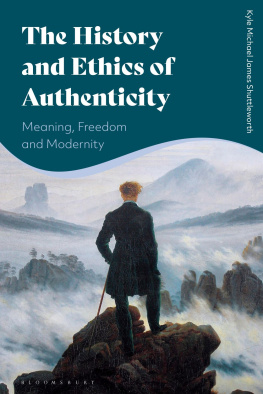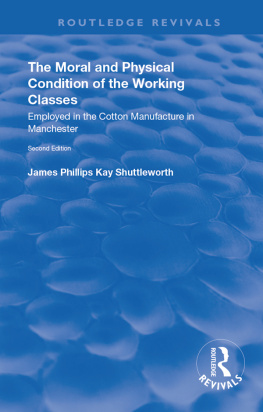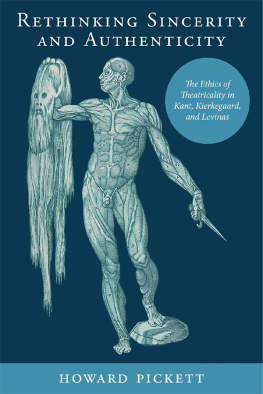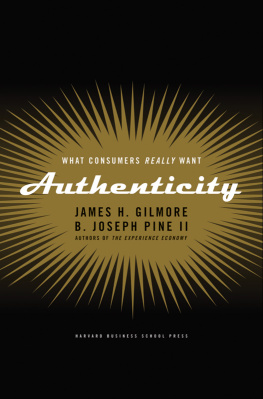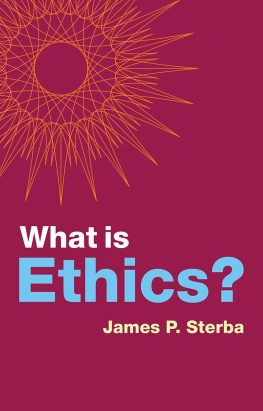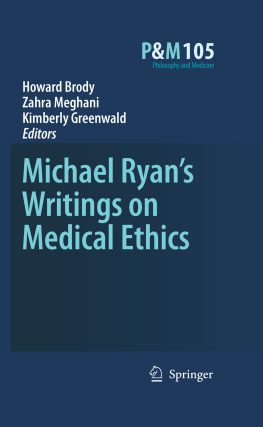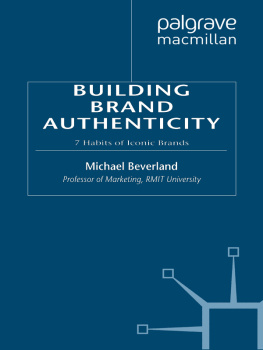Kyle Michael James Shuttleworth - The History and Ethics of Authenticity: Meaning, Freedom, and Modernity
Here you can read online Kyle Michael James Shuttleworth - The History and Ethics of Authenticity: Meaning, Freedom, and Modernity full text of the book (entire story) in english for free. Download pdf and epub, get meaning, cover and reviews about this ebook. year: 2020, publisher: Bloomsbury, genre: Science. Description of the work, (preface) as well as reviews are available. Best literature library LitArk.com created for fans of good reading and offers a wide selection of genres:
Romance novel
Science fiction
Adventure
Detective
Science
History
Home and family
Prose
Art
Politics
Computer
Non-fiction
Religion
Business
Children
Humor
Choose a favorite category and find really read worthwhile books. Enjoy immersion in the world of imagination, feel the emotions of the characters or learn something new for yourself, make an fascinating discovery.
- Book:The History and Ethics of Authenticity: Meaning, Freedom, and Modernity
- Author:
- Publisher:Bloomsbury
- Genre:
- Year:2020
- Rating:4 / 5
- Favourites:Add to favourites
- Your mark:
- 80
- 1
- 2
- 3
- 4
- 5
The History and Ethics of Authenticity: Meaning, Freedom, and Modernity: summary, description and annotation
We offer to read an annotation, description, summary or preface (depends on what the author of the book "The History and Ethics of Authenticity: Meaning, Freedom, and Modernity" wrote himself). If you haven't found the necessary information about the book — write in the comments, we will try to find it.
The History and Ethics of Authenticity: Meaning, Freedom, and Modernity — read online for free the complete book (whole text) full work
Below is the text of the book, divided by pages. System saving the place of the last page read, allows you to conveniently read the book "The History and Ethics of Authenticity: Meaning, Freedom, and Modernity" online for free, without having to search again every time where you left off. Put a bookmark, and you can go to the page where you finished reading at any time.
Font size:
Interval:
Bookmark:

The History and Ethics of Authenticity
Know thyself was written over the portal of the antique world. Over the portal of the new world, Be thyself.
~ Oscar Wilde; The Soul of Man Under Socialism
The History and Ethics of Authenticity
Meaning, Freedom and Modernity
Kyle Michael James Shuttleworth

Contents
The contents of this book represent the culmination of over a decade of philosophical enquiry and thought. Although I began this particular project as a doctoral student and brought it to completion as Visiting Research Fellow at Queens University Belfast, many of the ideas contained within occurred to me prior to undertaking philosophy as an academic endeavour. My personal motive for studying philosophy was to come to terms with the modern world as a fluid, dynamic and shifting concept; to discover what it means to live well; and to understand my place within such a conceptual framework. With this book I have sought to satisfy these concerns by articulating modernity as a philosophical problem and the ethics of authenticity as a response.
Whilst this book may bear my name alone, human beings do not develop independently of one another. We are, rather, as I argue, dialogical beings who owe our identity to the many cultural contexts and communities to which we belong. With this in mind, it would be ignorant to believe that the completion of this book could have been achieved in isolation. First and foremost, I owe an immense debt of gratitude to my doctoral supervisors: Keith Breen and Cillian McBride. Both of whom pushed me in directions which I was initially reluctant to go and whose advice and encouragement made this project far more successful than I alone could have imagined or achieved. I am also obligated to the examiners of my viva voce, Jonathan Webber and Fabian Schuppert, who pushed me beyond my comfort zone, forcing me to think on my feet and testing the commitment to my ideal (which I hope was maturely conceived!)
I am simultaneously appreciative and apologetic to the audiences of countless conferences and workshops to whom I subjected work in progress and who offered valuable, and much appreciated, constructive criticism on early chapter drafts. The primary outlet for my research was the immensely beneficial Friday Ethics Workshop at Queens and its regular attendants: Cillian McBride, Keith Breen, Tom Walker, Jeremy Watkins, Josh Milburn, Hanhui Xu, Suzanne Whitten and Michael Whitten. I am also thankful to my friends and fellow members of the Sartre Society UK (Jonathan Webber, T Storm Heter, Maria Russo) and the European Network of Japanese Philosophy (Hans Peter Liederbach, Yusa Michiko, Inutsuka Yu, Morisato Takeshi), where I not only received valuable feedback on presentations but also developed many of my ideas during intervals and coffee breaks.
I also owe special thanks to Gaven Kerr who encouraged me to pursue doctoral research whilst I was still an undergraduate student, and whose friendship has endured as long as my formal philosophical training. Last but not least, I am grateful to my parents and grandparents: Margaret Shuttleworth, Alan Shuttleworth, the late Rita Parkinson and Joseph Parkinson who encouraged and helped cultivate my intellectual curiosity. Finally, my best friend Sayaka Shuttleworth for her infinite patience and belief in my ability to bring this book to completion, especially when my own confidence began to falter.
K.M.J.S.
The first documented concern with the authenticity of a work of art dates to the nineteenth century and two almost identical paintings of Raphaels portrait of Pope Leo X, located in Florence and Naples, respectively. On a visit to the late popes family in the 1520s, the Marquis of Mantua perceived the painting, became enamoured and requested it for his own collection. The Marquiss request was granted, and the painting was brought to the artist Andrea del Sarto to construct a suitable frame. Whilst in his possession, Sarto made a duplicate of the painting which was deemed to be aesthetically on par with the original. The duplicate was then presented to the Marquis, who upon being informed that it was not painted by Raphael nevertheless praised the painting in terms of the artists own merit. However, attitudes towards duplicates changed in the nineteenth century. As Jonathan Keats articulates,
whilst Andrea del Sarto was still venerated in the 1800s ranking just a tier below Raphael and Michelangelo skill was no longer valued as highly as authenticity. Whether the Popes damask looked realistic was secondary to whether Raphael had painted it. Experts made a living assembling and documenting provenance. Eventually, Naples was humbled by scholarly consensus that Florence had the original painting. (: 3)
In this regard, the authenticity of a work of art refers to an artistic creation which can be verified in terms of provenance and by connoisseurs who possess expertise in the techniques and mind-set of the artist in question. Here an epistemological distinction is made between an original and a replica which has been produced with the intention of deceiving others. With the increase of modern technology, skill is no longer required to replicate works of art, and forgery has become much more prevalent. One reason why reproductions are deemed inferior is because they lack the history of the original. According to Walter Benjamin, : 125). The authenticity of art pertains to not only paintings but also music and in particular the genres of punk rock and hip-hop.
In 1975 a group of working-class lads from London debuted under the stage name The Sex Pistols. Their political messages of anti-establishment and disenfranchisement soon came to epitomize punk culture. However, questions surrounding their legitimacy arose. When the groups manager Malcolm McLaren first encountered the soon-to-be lead vocalist, John Johnny Rotten Lyndon, Lyndon had orange hair and was wearing a Pink Floyd t-shirt to which he had prefixed I hate. And although Lyndon was a substandard vocalist, McLaren invited him to join the group on account of his unique sense of style. Another iconic member of the band, John Sid Vicious Richie was originally introduced as a bassist but was deemed incompetent indeed, Richie only featured on one track on the iconic God Save the Queen album, which was eventually dubbed over nevertheless Richie was not introduced for his musical talent, but for his arrogant, outspoken attitude which caused frequent controversy, and thus publicity, at their shows. Despite the questionable recruitment of members, and whether the group was manufactured by McLaren, the issue of authenticity arose in relation to the backgrounds of the members themselves. As Peter York makes explicit, because of punks creation myth that it was all about alienated, working-class youths breaking through the authenticity debate arrived immediately after with the most literal-minded Jacobin interrogation. Every punk band had to face a new line of questioning. How genuinely working class were they? (: 42).
In hip-hop, rap artists place a premium on keeping it real by remaining true to the customs and values of the cultural community within which they were raised. One of the first and most prominent rap groups to provide a social commentary on the gangster lifestyle prevalent within American ghettos was N.W.A. However, the groups song writer OShea Ice-Cube Jackson did not personally partake in the violence-fuelled culture conveyed in his lyrics. To maintain an air of authenticity, Eric Easy-E Wright, who was renowned for his street-sense, was introduced as a frontman for the group. After disagreements over royalties, Jackson departed from the group to pursue a solo career though : 136). Thus, for punk rock and hip-hop, as with art, the question of authenticity is a question of provenance: Is the disadvantaged rhetoric real, are the artists disenfranchised as their lyrics portray, and are they pretending to be something they are not?
Font size:
Interval:
Bookmark:
Similar books «The History and Ethics of Authenticity: Meaning, Freedom, and Modernity»
Look at similar books to The History and Ethics of Authenticity: Meaning, Freedom, and Modernity. We have selected literature similar in name and meaning in the hope of providing readers with more options to find new, interesting, not yet read works.
Discussion, reviews of the book The History and Ethics of Authenticity: Meaning, Freedom, and Modernity and just readers' own opinions. Leave your comments, write what you think about the work, its meaning or the main characters. Specify what exactly you liked and what you didn't like, and why you think so.

